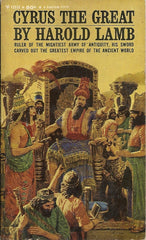Author: Harold Lamb
Harold Albert Lamb (September 1, 1892 – April 9, 1962) was an American historian, screenwriter, short story writer, and novelist.
Lamb built a career with his writing from an early age. He got his start in the pulp magazines, quickly moving to the prestigious Adventure magazine, his primary fiction outlet for nineteen years. In 1927 he wrote a biography of Genghis Khan, and following on its success turned more and more to the writing of non-fiction, penning numerous biographies and popular history books until his death in 1962 in Rochester, N.Y. The success of Lamb's two-volume history of the Crusades led to his discovery by Cecil B. DeMille, who employed Lamb as a technical advisor on a related movie, The Crusades, and used him as a screenwriter on many other DeMille movies thereafter. Lamb spoke French, Latin, Persian, and Arabic, and, by his own account, a smattering of Manchu-Tartar.
Lamb's prose was direct and fast-paced, in stark contrast to that of many of his contemporary adventure writers. His stories were well-researched and rooted in their time, often featuring real historical characters, but set in places unfamiliar and exotic to most of the western audience reading his fiction. While his adventure stories had familiar tropes such as tyrannical rulers and scheming priests, he avoided the simplistic depiction of foreign or unfamiliar cultures as evil; many of his heroes were Mongolian, Indian, Russian, or Muslim. Most of his protagonists were outsiders or outcasts apart from civilization, and all but a very few were skilled swordsman and warriors.
In a Lamb story, honor and loyalty to one's comrades-in-arms were more important than cultural identity, although often his protagonists ended up risking their lives to protect the cultures that had spurned them. Those holding positions of authority are almost universally depicted as being corrupted by their own power or consumed with greed, be they Russian boyars or Buddhist priests, and merchants are almost always shown as placing their own desire for coin above the well-being of their fellow men. Loyalty, wisdom, and religious piety is shown again and again in these stories to lie more securely in the hands of Lamb's common folk.
While female characters occasionally played the familiar role of damsel in distress in these stories, Lamb more typically depicted his women as courageous, independent, and more shrewd than their male counterparts. Their motives and true loyalties, though, remained mysterious to Lamb's male characters, and their unknowable nature is frequently the source of plot tension.




